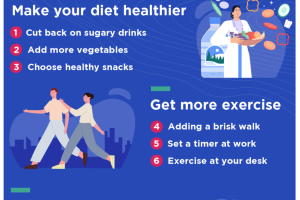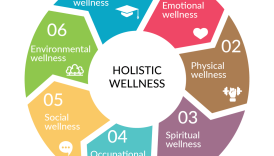The Pfizer Guide to a Healthy Lifestyle: Tips for Living Well

The Importance of Healthy Lifestyle Choices
In today’s fast-paced world, making healthy lifestyle choices can often feel overwhelming. From busy schedules to the abundance of processed foods, many find it challenging to prioritize well-being. However, understanding the importance of healthy habits is crucial in fostering a balanced life. Imagine waking up every day feeling energized, optimistic, and ready to conquer the world. This sense of vitality starts with small, intentional decisions regarding one’s health. People often overlook the cumulative effect of daily choices, but each step taken toward a healthier lifestyle adds up significantly over time. Here are some compelling reasons why these choices matter:
- The Pfizer Guide to a Healthy Lifestyle: Tips for Living Well
- The Importance of Healthy Lifestyle Choices
- Nutrition Tips
- Balanced Diet
- Importance of Hydration
- Fitness Advice
- Regular Exercise
- Incorporating Strength Training
- Mental Well-being
- Stress Management Techniques
- Importance of Sleep
- Preventive Healthcare
- Regular Check-ups
- Vaccinations
- Social Connections
- Building Relationships
- Managing Social Media Usage
- Physical Health: Embracing nutritious foods and regular exercise lowers the risk of chronic diseases. For instance, a friend of mine switched to a balanced diet rich in whole foods and found that their energy levels soared, transforming their everyday productivity.
- Mental Clarity: Healthy eating and regular movement are linked to better brain function. Studies indicate that a nutritious diet can enhance memory and sharpen focus.
- Emotional Balance: Engaging in healthy activities often leads to improved mood. Practicing mindfulness or participating in physical activities can reduce stress and anxiety. My personal experience with yoga has repeatedly demonstrated its ability to ground me during hectic weeks.
Ultimately, fostering healthy lifestyle choices is not merely about avoiding illness; it’s about nurturing a life full of vitality, joy, and connection. By focusing on nutrition, fitness, mental well-being, preventive healthcare, and social relationships, anyone can create a vibrant and fulfilling lifestyle.
Nutrition Tips
Balanced Diet
After recognizing the importance of healthy lifestyle choices, it’s essential to delve into the nutritional aspect of well-being. A balanced diet serves as the foundation of overall health, supporting everything from physical performance to mental clarity. This doesn’t mean strictly adhering to bland diets; rather, it’s about incorporating a variety of foods that provide essential nutrients. Components of a Balanced Diet:
- Fruits and Vegetables: Aim for at least five servings a day. They are rich in vitamins, minerals, and antioxidants.
- Whole Grains: Opt for whole-grain bread, brown rice, and oatmeal instead of refined grains for sustained energy.
- Proteins: Include lean meats, fish, legumes, and nuts, which are vital for muscle repair and immune function.
- Healthy Fats: Avocados, olive oil, and nuts contribute to heart health when consumed in moderation.
For example, when my sister started preparing rainbow bowls filled with colorful vegetables and proteins, not only did her meals taste better, but she also noticed an increase in her energy throughout the day.
Importance of Hydration
Equally important as a balanced diet is hydration. Water plays a crucial role in nearly every bodily function, including digestion, absorption, and regulation of body temperature. Here are some hydration tips to consider:
- Daily Intake: Aim for at least 8 glasses of water a day, but this can vary based on activity levels and climate.
- Mind Your Thirst: Don’t wait until you’re thirsty to drink water; make it a habit to sip throughout the day.
- Fruits and Vegetables: Incorporate water-rich foods like cucumbers, oranges, and watermelon to help maintain hydration.
Remember, dehydration can lead to fatigue, headaches, and decreased concentration. When I started carrying a reusable water bottle, I found it easier to stay hydrated, especially during busy days. Often, just a glass of water would drastically shift how I felt—highlighting the simple yet profound impact of adequate hydration.
Fitness Advice
Regular Exercise
Moving beyond nutrition, regular exercise is pivotal for maintaining a healthy lifestyle. It not only helps in managing weight but also boosts mood, improves energy levels, and enhances overall well-being. Finding a workout routine that fits one’s lifestyle is key to making exercise a sustainable habit. Tips for Incorporating Regular Exercise:
- Set Realistic Goals: Start small and gradually increase duration and intensity. Aiming for just 30 minutes of activity a day can produce significant benefits.
- Choose Activities You Enjoy: Whether it’s dancing, cycling, or brisk walking, selecting enjoyable activities makes it easier to stick to a routine. For instance, joining a local hiking group transformed exercise from a chore into a social adventure for my weekends.
- Mix It Up: Incorporating a variety of workouts can prevent boredom and keep you motivated, from cardio sessions to yoga classes.
Incorporating Strength Training
While regular exercise is crucial, strength training deserves special attention. It’s often misunderstood or neglected, especially among those who believe it’s only for bodybuilders. However, strength training offers numerous benefits, including improved metabolism, enhanced muscle tone, and stronger bones. Ways to Include Strength Training:
- Bodyweight Exercises: Begin with exercises like push-ups, squats, and lunges. They can be done anywhere and require no equipment.
- Resistance Bands: These are portable, affordable, and perfect for adding resistance without the need for heavy weights.
- Weight Lifting: If comfortable in a gym, gradually incorporating dumbbells or kettlebells can build strength effectively.
A close friend of mine, who was initially hesitant to start lifting weights, discovered newfound confidence and strength after just a few weeks of a tailored program. The transformation not only took place physically but also mentally, as she felt empowered by her progress. By making both regular exercise and strength training part of your routine, you lay a robust foundation for a healthier, more active lifestyle.
Mental Well-being
Stress Management Techniques
Transitioning from fitness to mental well-being, it’s crucial to address how stress impacts our overall health. In a world where obligations often pile up, developing effective stress management techniques can make a significant difference in maintaining balance. Practical Stress Management Strategies:
- Mindfulness and Meditation: Spending just a few minutes each day focusing on the present can reduce anxiety. A personal favorite of mine is guided meditation apps, which make it easy to unwind after a busy day.
- Deep Breathing Exercises: Practicing deep breathing can quickly alleviate stress. Inhale for four counts, hold for four, then exhale for six. Even my son uses this technique during his exams to center himself.
- Physical Activity: As previously discussed, engaging in exercise can be a potent stress reliever. Even a simple walk outdoors can clear the mind and improve one’s mood.
Importance of Sleep
Another vital component of mental well-being is sleep. Poor sleep can negatively affect mood, cognitive function, and overall health. Making sleep a priority is not just beneficial but essential for maintaining mental clarity and emotional resilience. Strategies for Better Sleep:
- Establish a Sleep Routine: Going to bed and waking up at the same time each day can regulate your body’s internal clock. Implementing this routine helped me wake up feeling refreshed and ready to tackle the day.
- Create a Restful Environment: Ensure your bedroom is dark, quiet, and cool. Consider using blackout curtains or white noise machines if needed.
- Limit Screen Time Before Bed: The blue light emitted by devices can interfere with sleep hormone production. A simple change I made was to read a book instead of scrolling through my phone before sleep.
By integrating effective stress management techniques and prioritizing sleep, one can significantly enhance mental well-being. The journey towards mental clarity and emotional balance is ongoing, but with the right practices, individuals can cultivate a healthier, happier mindset.
Preventive Healthcare
Regular Check-ups
As we continue our journey toward holistic health, it’s crucial to emphasize the significance of preventive healthcare. Regular check-ups are one of the cornerstones of maintaining good health, helping to catch potential issues before they escalate. It’s easy to overlook preventive measures when life gets busy, but making them a priority can lead to healthier outcomes. Benefits of Regular Check-ups:
- Early Detection: Many conditions, such as hypertension or high cholesterol, can be managed more effectively when detected early. A close friend of mine discovered a heart condition during a routine exam, which led to timely intervention and treatment.
- Health Monitoring: Regular visits allow healthcare providers to monitor existing health conditions and adjust treatment plans accordingly. This proactive approach often leads to better health management.
- Building a Relationship with Your Provider: Regular check-ups can foster a stronger patient-doctor relationship, creating an open line of communication for health concerns.
Vaccinations
In addition to check-ups, vaccinations play a vital role in preventive healthcare. They protect not only individual health but also contribute to public health by reducing the spread of infectious diseases. Key Points about Vaccinations:
- Protection from Diseases: Vaccines are designed to safeguard against serious illnesses. For instance, after getting the flu shot for the first time, I noticed that my chances of falling ill during the winter significantly decreased.
- Community Immunity: When a large portion of the population is vaccinated, it can help prevent outbreaks, protecting those who cannot be vaccinated for medical reasons.
- Stay Informed: Keep up with vaccination schedules recommended by health authorities. Traveling to different countries may also require additional vaccinations for safety.
By prioritizing regular check-ups and vaccinations, individuals can take assertive steps towards safeguarding their health. These preventive measures not only enhance personal well-being but also contribute positively to the health of the community, creating a stronger, healthier society for everyone.
Social Connections
Building Relationships
Transitioning from preventive healthcare, we must acknowledge the significant role that social connections play in our overall well-being. Building and nurturing relationships can enhance emotional support, reduce stress, and even improve longevity. As humans, we thrive on connection, and creating meaningful relationships is fundamental to a fulfilling life. Key Aspects of Building Relationships:
- Quality Over Quantity: It’s not about the number of friends but the quality of those connections. Focus on nurturing friendships that uplift and inspire you. For instance, my closest friends are those who always provide encouragement, and we regularly gather for coffee chats to share our experiences and support each other.
- Active Listening: Building strong relationships requires being present. Practice active listening when engaging with others. Not only does it show you value their input, but it also strengthens bonds by fostering mutual respect.
- Participate in Community Activities: Engaging in local clubs, classes, or volunteering can provide an excellent platform to meet new people and create lasting friendships. I met several of my best friends through a community gardening group, all while beautifying our neighborhood!
Managing Social Media Usage
In today’s digital age, social media can be both a tool for connection and a source of stress. Learning to manage social media usage is essential in maintaining healthy relationships and mental well-being. Tips for Managing Social Media:
- Set Boundaries: Establish time limits for social media use to prevent it from consuming your day. I started designating “tech-free” hours in the evening, allowing me to focus on face-to-face interactions.
- Foster Meaningful Connections: Use social media to connect with friends and family intentionally. Engage in meaningful conversations instead of simply scrolling through feeds. My experience has shown that sending a personalized message can rekindle long-lost friendships.
- Limit Negative Influences: Unfollow accounts that negatively impact your mood or self-esteem. Curating your online presence to reflect positivity can lead to a healthier digital experience.
By fostering strong relationships and managing social media wisely, individuals can cultivate a supportive social environment that enhances mental well-being. Connecting with others, whether in person or online, serves as a critical pillar for living a balanced and fulfilling life.





